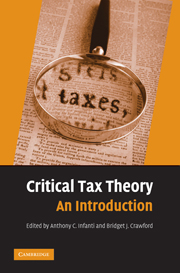Book contents
- Frontmatter
- Contents
- List of Illustrations
- List of Tables
- List of Contributors
- List of Common Abbreviations
- Introduction
- CHAPTER 1 FOUNDATIONS OF CRITICAL TAX THEORY
- CHAPTER 2 HISTORICAL PERSPECTIVES ON TAXATION
- CHAPTER 3 THE GOALS OF TAX POLICY
- CHAPTER 4 CRITICAL TAX THEORY MEETS PRACTICE
- A Legislator Named Sue: Re-Imagining the Income Tax
- Using the Social Background Model to Explain Who Wins Federal Appellate Tax Decisions: Do Less Traditional Judges Favor the Taxpayer?
- Tax Protest, “A Homosexual,” and Frivolity: A Deconstructionist Meditation
- Sisters in Law: Gender and the Interpretation of Tax Statutes
- Deconstructing the Duty to the Tax System: Unfettering Zealous Advocacy on Behalf of Lesbian and Gay Taxpayers
- CHAPTER 5 RACE AND TAXATION
- CHAPTER 6 GENDER AND TAXATION
- CHAPTER 7 SEXUAL ORIENTATION AND TAXATION
- CHAPTER 8 THE FAMILY AND TAXATION
- CHAPTER 9 CLASS AND TAXATION
- CHAPTER 10 DISABILITY AND TAXATION
- CHAPTER 11 GLOBAL CRITICAL PERSPECTIVES ON TAXATION
- CHAPTER 12 CRITICAL PERSPECTIVES ON CRITICAL TAX THEORY
- Index
Using the Social Background Model to Explain Who Wins Federal Appellate Tax Decisions: Do Less Traditional Judges Favor the Taxpayer?
Published online by Cambridge University Press: 04 August 2010
- Frontmatter
- Contents
- List of Illustrations
- List of Tables
- List of Contributors
- List of Common Abbreviations
- Introduction
- CHAPTER 1 FOUNDATIONS OF CRITICAL TAX THEORY
- CHAPTER 2 HISTORICAL PERSPECTIVES ON TAXATION
- CHAPTER 3 THE GOALS OF TAX POLICY
- CHAPTER 4 CRITICAL TAX THEORY MEETS PRACTICE
- A Legislator Named Sue: Re-Imagining the Income Tax
- Using the Social Background Model to Explain Who Wins Federal Appellate Tax Decisions: Do Less Traditional Judges Favor the Taxpayer?
- Tax Protest, “A Homosexual,” and Frivolity: A Deconstructionist Meditation
- Sisters in Law: Gender and the Interpretation of Tax Statutes
- Deconstructing the Duty to the Tax System: Unfettering Zealous Advocacy on Behalf of Lesbian and Gay Taxpayers
- CHAPTER 5 RACE AND TAXATION
- CHAPTER 6 GENDER AND TAXATION
- CHAPTER 7 SEXUAL ORIENTATION AND TAXATION
- CHAPTER 8 THE FAMILY AND TAXATION
- CHAPTER 9 CLASS AND TAXATION
- CHAPTER 10 DISABILITY AND TAXATION
- CHAPTER 11 GLOBAL CRITICAL PERSPECTIVES ON TAXATION
- CHAPTER 12 CRITICAL PERSPECTIVES ON CRITICAL TAX THEORY
- Index
Summary
Legal research examining how judges decide cases has begun to complement political science literature about the effects of judges' social backgrounds on their decisions in various areas of the law. However, very little systematic research has been conducted with respect to tax litigation, and almost none has analyzed whether or how a judge's social background influences the outcome of tax litigation. This [article] applies social science techniques to a data set of recent federal appellate tax cases compiled for this paper to study the connection between outcomes of tax litigation and the social backgrounds of the deciding judges.
This article tests two hypotheses about appellate-level tax decisions: (1) the social background of judges influences who wins cases; and (2) judges with less traditional social backgrounds – judges without elite educations, or who were women or not white – are likelier to decide in the taxpayer's favor than are judges with more traditional social backgrounds.
The first hypothesis is borne out by the evidence: many aspects of judges' social backgrounds are associated with who won the cases in this data set. The second thesis is also sustained by the evidence: social background factors of a “less traditional judge” are associated with pro-taxpayer outcomes.
THE LITERATURE
One characterization of judicial decision making is that judges engage in traditional legal reasoning, applying the law to the facts, and, implicitly, that any judge should arrive at the same result if presented with the same law and factual situation.
- Type
- Chapter
- Information
- Critical Tax TheoryAn Introduction, pp. 82 - 87Publisher: Cambridge University PressPrint publication year: 2009
- 4
- Cited by



